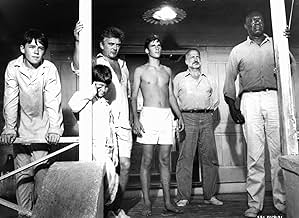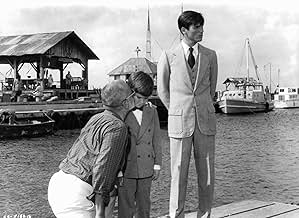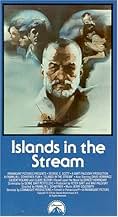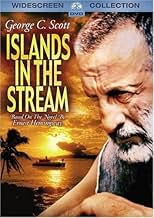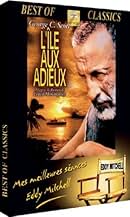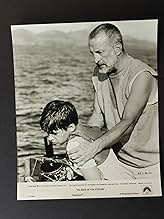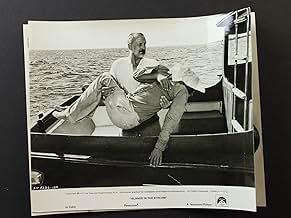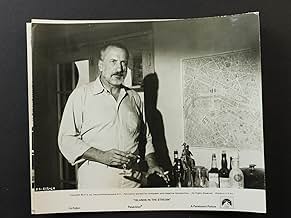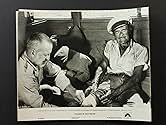VALUTAZIONE IMDb
6,5/10
1742
LA TUA VALUTAZIONE
Aggiungi una trama nella tua linguaAn isolated sculptor is visited by his three sons just before the start of WWII.An isolated sculptor is visited by his three sons just before the start of WWII.An isolated sculptor is visited by his three sons just before the start of WWII.
- Regia
- Sceneggiatura
- Star
- Candidato a 1 Oscar
- 4 candidature totali
Recensioni in evidenza
I found this film in the bargain DVD bin, so I went ahead and got it. The movie moves slow, but in a peaceful way, capturing the charm of real-life in the Caribbean. It's mostly an atmosphere-movie -- the charm of the movie is not so much in it's plot (Hemingway writes much better than his movies translate) but in the feel of the characters, and the beauty of its locale.
Set in the 1940's, it barely touches on WWII, and when it does, it seems to do so 'down a long hallway, darkly' -- that is to say, it feels distant.
George C Scott does a pretty darned good job with the lead character. Great actors never fail to elevate a movie. There's another fine performance put in by David Hemmings (Who I'd never seen before, and I learn from the IMDb database died in 2003) as the 'rummy' named Eddy.
The musical score is weird -- it really seems to stay with you after the movie is done. The previous commenter is correct -- the movie has a dreamy feel to it. There's very little by way of violence (at least by today's standards). What little there is, at the end, is accompanied by garishly bright and unrealistic blood.
Nonetheless, check this film out. It's truly an interesting and fun film.
Set in the 1940's, it barely touches on WWII, and when it does, it seems to do so 'down a long hallway, darkly' -- that is to say, it feels distant.
George C Scott does a pretty darned good job with the lead character. Great actors never fail to elevate a movie. There's another fine performance put in by David Hemmings (Who I'd never seen before, and I learn from the IMDb database died in 2003) as the 'rummy' named Eddy.
The musical score is weird -- it really seems to stay with you after the movie is done. The previous commenter is correct -- the movie has a dreamy feel to it. There's very little by way of violence (at least by today's standards). What little there is, at the end, is accompanied by garishly bright and unrealistic blood.
Nonetheless, check this film out. It's truly an interesting and fun film.
This adaptation of a series of Hemingway stories never fails to be engaging. George C. Scott stars as a sculptor, Thomas Hudson, who lives in a Bahamian island paradise in 1940. The world is on the cusp of WWII, but people like Thomas aren't likely to be deeply affected by it, apart from the Jewish refugees that sometimes turn up on their island. That summer, Thomas is visited by his three sons - Tom (Hart Bochner), Andy (Brad Savage), and Davy (Michael-James Wixted) - whom he's sired with two different wives.
The script, by Denne Bart Petitclerc, follows a three-act structure, as it portrays Thomas' relationship with "The Boys", is visited by Toms' mother (Claire Boom) during "The Woman", and they reminisce about their past, and finally, shows what happens as Thomas and his friends Joseph (Julius Harris) and Eddy (David Hemmings) undertake "The Journey", wherein they act upon a chance to do some good.
Reuniting Scott with his "Patton" director, Franklin J. Schaffner, "Islands in the Stream" is a deliberately paced drama with a pleasant feel to it during its first two thirds, and an almost dream-like quality. Certainly it's very easy on the eyes, with its gorgeous photography of these exotic locations. It's also accompanied by a wonderful Jerry Goldsmith soundtrack. While some viewers might feel that the film goes downhill in its final third, this viewer never lost interest (although, admittedly, "Islands in the Stream" is never better than when it's a story of a father and his sons).
Scott gives one of his most engaging performances of all time, with similarly laudable work by such performers as Harris ("Live and Let Die"), Hemmings ("Deep Red"), Bloom ("The Haunting"), Gilbert Roland ("The Bad and the Beautiful"), Susan Tyrrell ("Forbidden Zone"), and Richard Evans ("Dirty Little Billy"). Bochner (in his feature debut), Savage, and Wixted are very appealing as the sons.
Overall, this is definitely worth a look: a nicely nuanced look at an interesting man - maybe not a truly great man - but who has certainly earned the admiration of his friends and offspring.
Seven out of 10.
The script, by Denne Bart Petitclerc, follows a three-act structure, as it portrays Thomas' relationship with "The Boys", is visited by Toms' mother (Claire Boom) during "The Woman", and they reminisce about their past, and finally, shows what happens as Thomas and his friends Joseph (Julius Harris) and Eddy (David Hemmings) undertake "The Journey", wherein they act upon a chance to do some good.
Reuniting Scott with his "Patton" director, Franklin J. Schaffner, "Islands in the Stream" is a deliberately paced drama with a pleasant feel to it during its first two thirds, and an almost dream-like quality. Certainly it's very easy on the eyes, with its gorgeous photography of these exotic locations. It's also accompanied by a wonderful Jerry Goldsmith soundtrack. While some viewers might feel that the film goes downhill in its final third, this viewer never lost interest (although, admittedly, "Islands in the Stream" is never better than when it's a story of a father and his sons).
Scott gives one of his most engaging performances of all time, with similarly laudable work by such performers as Harris ("Live and Let Die"), Hemmings ("Deep Red"), Bloom ("The Haunting"), Gilbert Roland ("The Bad and the Beautiful"), Susan Tyrrell ("Forbidden Zone"), and Richard Evans ("Dirty Little Billy"). Bochner (in his feature debut), Savage, and Wixted are very appealing as the sons.
Overall, this is definitely worth a look: a nicely nuanced look at an interesting man - maybe not a truly great man - but who has certainly earned the admiration of his friends and offspring.
Seven out of 10.
Islands in the Stream (1977); Directed by: Franklin J. Schaffner; Starring: George C. Scott, David Hemmings, Hart Bochner, Clair Bloom et al.
This film didn't attract too much attention to itself, even though it marks the reunion of Franklin J. Schaffner and George C. Scott, who first collaborated on the magnificent "Patton", and it's an adaptation of a Hemmingway novel. It's almost forgotten by now, but luckily Paramount released a DVD of it, so that today's audience can discover this wonderful 'forgotten' film. I bought this film for the pairing of Schaffner and Scott and the score by Jerry Goldsmith. To say the least: I wasn't disappointed.
This is a contemplative film, with many low-key scenes and a slow pace. It's about Thomas Hudson, who has retreated to an island in the Bahamas and is working there quietly as an artist. His best friend Eddy is there too and he's looked after by Hudson, because he is a rummy and gets in a fight a bit too often. Joseph helps Hudson out in his daily business and the two are close friends. The film is made up of three chapters. The first chapter is called "The Boys" and is about Hudson's three sons visiting him for the summer. His eldest son, Tommy, is from his first marriage and the younger two, David and Andrew, are from his second marriage. While the oldest and the youngest sons can get along with Hudson really well, it's David who holds a grudge against him for leaving him and his mother. Only after a fishing trip, where he struggles with a marlin for over three hours, does he forgive his father and does he embrace him. During their stay on the island, the Second World War draws closer and they can see burning ships on the horizon. After the boys have left, they receive a letter from their father, stating that he misses them very much and that their time together made him happy again. This chapter serves to pinpoint that although Hudson loves his retreat on the island, he also misses his boys really much and that they might be more important than himself. The second chapter is called "The Woman" and is about Hudson's first wife, Audrey, visiting the island. They talk a lot about their love for each other and the reasons for their failure together. When they're at Hudson's house and she starts drinking more and more he realizes that she's here to bring him very bad news. "The Journey" is the final chapter and tells the story of how Hudson finally realizes that he has to be with his boys on the mainland, instead of remaining forever on his island. In a way he decides to finally live again. He goes on a journey to the mainland, but the war gets between him and his goal. On the ocean he has to take a group of Jewish refugees onboard, because their ship was raided by the Cuban coastguard and they barely escaped. He decides that he should take them to shore, but when he does so, he has to escape the coastguard himself. The journey ends on a river somewhere nearby the Cuban coast, where Hudson pays a high price for his decision to start living again.
The film is beautifully filmed by Franklin Schaffner and the cinematography by Fred Koenekamp is gorgeous. Continuing their great working relation, Franklin hired Jerry Goldsmith to score the film. He delivers one of his most touching and most beautiful scores. It fits the film perfectly, capturing the emotional state Hudson is in with an almost melancholy theme, which is as restrained as Hudson and the film itself. There's a more whimsical theme for the boys and there is a majestic cue over the marlin fishing scene. Goldsmith also captures the rhythm of the ocean with his music. He's able to perfectly merge the emotions on screen with his music and he adapts his themes beautifully and in keeping with the heart of the film. The score thus becomes the film's heart and perhaps the best part about it. This is one of the best scores ever composed for a motion picture.
The performances are magnificent too. George C. Scott delivers a very subtle and beautifully executed performance, capturing the essence of Hudson's feelings and making his struggle feel entirely realistic. His performance is restrained, yet it gives a great view into the heart of the troubled main character. David Hemmings also delivers a great performance, making the audience feel sorry for Eddy, but also love him, He also makes Eddy's and Hudson's friendship a joy to watch. Clair Bloom as the first wife and Julius Harris as Joseph are great too, as are the actors playing the boys. Especially Michael-James Wixted as David is great, but Hart Bochner (as Tommy) and Brad Savage (as Andrew) deliver good performances too.
The film is very restrained and quiet and feels very real. The audience gets time to relate to Hudson as the film slowly tells more about him. The emotions are therefore never forced, nor do they feel faked. They feel real and the emotional journey becomes entirely believable and understandable. This approach is sadly quite seldom in Hollywood films. There's one problem though: the final chapter feels a bit off in relation to the other two chapters. The film moves into a chase and Hudson suddenly sympathizes a lot with the refugees, where he was much more restrained at first. Therefore the final chapter is not completely in line with Hudson's character. In the book he chases a German U-boat crew, instead of getting sympathetic with Jewish refugees, which sounds more right for the character. The last scenes are really powerful though, as is the final impact of this film. It made me quiet afterwards, contemplating the journey I had just taken with Hudson, but it also left a warm feeling behind.
8/10.
This film didn't attract too much attention to itself, even though it marks the reunion of Franklin J. Schaffner and George C. Scott, who first collaborated on the magnificent "Patton", and it's an adaptation of a Hemmingway novel. It's almost forgotten by now, but luckily Paramount released a DVD of it, so that today's audience can discover this wonderful 'forgotten' film. I bought this film for the pairing of Schaffner and Scott and the score by Jerry Goldsmith. To say the least: I wasn't disappointed.
This is a contemplative film, with many low-key scenes and a slow pace. It's about Thomas Hudson, who has retreated to an island in the Bahamas and is working there quietly as an artist. His best friend Eddy is there too and he's looked after by Hudson, because he is a rummy and gets in a fight a bit too often. Joseph helps Hudson out in his daily business and the two are close friends. The film is made up of three chapters. The first chapter is called "The Boys" and is about Hudson's three sons visiting him for the summer. His eldest son, Tommy, is from his first marriage and the younger two, David and Andrew, are from his second marriage. While the oldest and the youngest sons can get along with Hudson really well, it's David who holds a grudge against him for leaving him and his mother. Only after a fishing trip, where he struggles with a marlin for over three hours, does he forgive his father and does he embrace him. During their stay on the island, the Second World War draws closer and they can see burning ships on the horizon. After the boys have left, they receive a letter from their father, stating that he misses them very much and that their time together made him happy again. This chapter serves to pinpoint that although Hudson loves his retreat on the island, he also misses his boys really much and that they might be more important than himself. The second chapter is called "The Woman" and is about Hudson's first wife, Audrey, visiting the island. They talk a lot about their love for each other and the reasons for their failure together. When they're at Hudson's house and she starts drinking more and more he realizes that she's here to bring him very bad news. "The Journey" is the final chapter and tells the story of how Hudson finally realizes that he has to be with his boys on the mainland, instead of remaining forever on his island. In a way he decides to finally live again. He goes on a journey to the mainland, but the war gets between him and his goal. On the ocean he has to take a group of Jewish refugees onboard, because their ship was raided by the Cuban coastguard and they barely escaped. He decides that he should take them to shore, but when he does so, he has to escape the coastguard himself. The journey ends on a river somewhere nearby the Cuban coast, where Hudson pays a high price for his decision to start living again.
The film is beautifully filmed by Franklin Schaffner and the cinematography by Fred Koenekamp is gorgeous. Continuing their great working relation, Franklin hired Jerry Goldsmith to score the film. He delivers one of his most touching and most beautiful scores. It fits the film perfectly, capturing the emotional state Hudson is in with an almost melancholy theme, which is as restrained as Hudson and the film itself. There's a more whimsical theme for the boys and there is a majestic cue over the marlin fishing scene. Goldsmith also captures the rhythm of the ocean with his music. He's able to perfectly merge the emotions on screen with his music and he adapts his themes beautifully and in keeping with the heart of the film. The score thus becomes the film's heart and perhaps the best part about it. This is one of the best scores ever composed for a motion picture.
The performances are magnificent too. George C. Scott delivers a very subtle and beautifully executed performance, capturing the essence of Hudson's feelings and making his struggle feel entirely realistic. His performance is restrained, yet it gives a great view into the heart of the troubled main character. David Hemmings also delivers a great performance, making the audience feel sorry for Eddy, but also love him, He also makes Eddy's and Hudson's friendship a joy to watch. Clair Bloom as the first wife and Julius Harris as Joseph are great too, as are the actors playing the boys. Especially Michael-James Wixted as David is great, but Hart Bochner (as Tommy) and Brad Savage (as Andrew) deliver good performances too.
The film is very restrained and quiet and feels very real. The audience gets time to relate to Hudson as the film slowly tells more about him. The emotions are therefore never forced, nor do they feel faked. They feel real and the emotional journey becomes entirely believable and understandable. This approach is sadly quite seldom in Hollywood films. There's one problem though: the final chapter feels a bit off in relation to the other two chapters. The film moves into a chase and Hudson suddenly sympathizes a lot with the refugees, where he was much more restrained at first. Therefore the final chapter is not completely in line with Hudson's character. In the book he chases a German U-boat crew, instead of getting sympathetic with Jewish refugees, which sounds more right for the character. The last scenes are really powerful though, as is the final impact of this film. It made me quiet afterwards, contemplating the journey I had just taken with Hudson, but it also left a warm feeling behind.
8/10.
This is one of the most memorable and moving films I saw in the 70s. Perfectly photographed and gently presented, this drama of a family dissecting how they feel about their artist father and his island atoll existence transports the viewer to genuinely feel as though we have been there as well. I revisited this film several times in 1978 taking friends and family and it became a completely immersing experience, and each visit made me admire the production, writing and themes more. It is presented as a trilogy, a family photo album in three parts, each with quiet profound realizations (without the screaming today would need) and presents the often sad or misplaced loyalty / admiration this 'great man' (Scott) commands but does not perhaps deserve. It is just a great great film instead. The scene in the second sequence where estranged wife Claire Bloom visits and takes him for a walk along the beach contains some of the most powerful acting I have ever enjoyed.. especially when Scott realizes why she has visited. Any time you see this film available, buy it or see it or take a good friend or family pal. Make it part of your life. I wish I could get a DVD and keep it so I can see it anytime. The music score is unforgettable. ISLANDS IN THE STREAM is one of the great 70s movies. Sad that it is so unknown. But you can change that. Spectacular young actor Hart Bochner possibly 19 at the time is the eldest of the three brothers, the younger two matching him as excellent actors. David Hemmings, just on the verge of losing his BLOW UP looks plays a drunken pal, and the glorious Claire Bloom as mentioned above is sublime. Add that to the Goldsmith score and the tropical locale, it is a solidly realized family drama that deserves wide appreciation.
"Islands in the Stream" takes place on an island in the Caribbean just before World War II. George C. Scott plays a sculptor, Thomas Hudson, who married twice, has three sons, and chooses to work in isolated island exile. Claire Bloom plays his estranged wife. The film has an episodic structure, probably because the screenwriter, Denne Bart Petitclerc based his script on a series of short stories by Ernest Hemingway that appeared in a women's magazine under the title "Island (singular) in the Stream." Had Hemingway lived, he would have combined this and additional material to publish the collection as a novel. Petitclerc does a good job of translating the work to the screen.
The episodes could stand alone, yet each is sufficiently connected both in character and time consecutively to create a coherent, full-length film. The first, "The Boys," has the greatest strength. We see the arrival of Hudson's sons and how each brings out a different quality in the relation of parent and child. Scott handles this, and the whole film, with a natural, understated, and thoughtful strength. His admirers should make an effort to see this wonderful performance in this lesser-known production. In the middle episode, Claire Bloom as the second wife complements Scott beautifully in a dialog minuet which unfolds the decline of their marriage.
The film also features excellent performances by David Hemmings and Michael-James Wixted as the sensitive middle son. A check of the IMDb reveals that he never made another movie, and that's a loss.
While the action takes place on a British possession in the West Indies, the producers chose to do the actual filming in Hawaii. The score by Jerry Goldsmith and cinematography by Fred Koenekamp work well. Koenekamp received an Oscar nomination for his work here; he'd previously won it for his work on Patton, also with director Franklin Schaffner and Scott. I recommend seeing this film in widescreen format for Koenekamp's compositions.
The episodes could stand alone, yet each is sufficiently connected both in character and time consecutively to create a coherent, full-length film. The first, "The Boys," has the greatest strength. We see the arrival of Hudson's sons and how each brings out a different quality in the relation of parent and child. Scott handles this, and the whole film, with a natural, understated, and thoughtful strength. His admirers should make an effort to see this wonderful performance in this lesser-known production. In the middle episode, Claire Bloom as the second wife complements Scott beautifully in a dialog minuet which unfolds the decline of their marriage.
The film also features excellent performances by David Hemmings and Michael-James Wixted as the sensitive middle son. A check of the IMDb reveals that he never made another movie, and that's a loss.
While the action takes place on a British possession in the West Indies, the producers chose to do the actual filming in Hawaii. The score by Jerry Goldsmith and cinematography by Fred Koenekamp work well. Koenekamp received an Oscar nomination for his work here; he'd previously won it for his work on Patton, also with director Franklin Schaffner and Scott. I recommend seeing this film in widescreen format for Koenekamp's compositions.
Lo sapevi?
- QuizJerry Goldsmith often said this was his favorite score he composed.
- BlooperWhen the boat is slowly cruising up the river in Cuba looking for refugees, a crew member's hand can be seen moving tree branches away from the camera.
- Citazioni
Thomas Hudson: I know now there's no "one thing" that is true. It is all true.
- ConnessioniFeatured in Survival Scars: Franklin J. Schaffner as Auteur (2023)
I più visti
Accedi per valutare e creare un elenco di titoli salvati per ottenere consigli personalizzati
- How long is Islands in the Stream?Powered by Alexa
Dettagli
Botteghino
- Lordo Stati Uniti e Canada
- 5.596.173 USD
- Lordo in tutto il mondo
- 5.596.173 USD
Contribuisci a questa pagina
Suggerisci una modifica o aggiungi i contenuti mancanti


